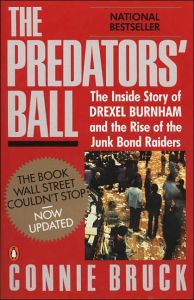Join getAbstract to access the summary!

Join getAbstract to access the summary!
Connie Bruck
The Predators' Ball
The Inside Story of Drexel Burnham and the Rise of the Junk Bond Raiders
Penguin, 1989
What's inside?
The rise and fall of Michael Milken’s junk bond empire.
Recommendation
Today the phrase “securities fraud” evokes Enron, WorldCom and Tyco. Two decades ago, it evoked Drexel Burnham Lambert, the investment bank that ruled the junk-bond realm and helped fund some of the most audacious corporate takeovers of the 1980s. Enthroned at the center of Drexel Burnham was the king of junk, Michael Milken. Was he a financial genius who found ever more clever ways to make markets more efficient? Or was he a swindler running the world’s biggest Ponzi scheme? New Yorker writer Connie Bruck sets out to answer those questions in this cautionary tale of Drexel’s rise and fall. getAbstract recommends this fascinating, highly detailed financial history. However, the flaw in Bruck's narrative is the absence of a third act: She inexplicably ends the book before Milken's trial and sentencing. While its ending is weak, this provocative story makes one thing clear: Uneasy lies the head that wears a leveraged crown.
Summary
About the Author
Connie Bruck is a staff writer for The New Yorker.

















Comment on this summary